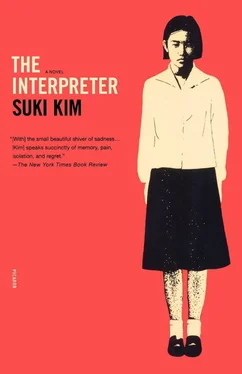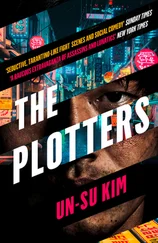The elevator reeks of urine and sweat. The floor appears not to have been swept in years. The loud bass line from a boom box vibrates through each floor, accompanied by the occasional shrill of a woman, either joyous or dying. Suzy pauses before the door marked 8F
Kim Yong Su is a truck deliveryman, which means that he should be home now. A deliveryman’s day begins around 10 p.m., when he drives his truck to the wholesalers in the Bronx Terminal Market or the Hunts Point Market and purchases the goods that have been ordered by his client stores. He then loads the boxes of fruits and vegetables onto a truck and starts making deliveries through the early-morning hours. On average, one driver has five or six stores on his roster. A regular truck won’t hold more than six stores’ worth of goods. He is the middleman. All deliveries must be made by at least 9 or 10 a.m., when the stores finish stocking inventories. By noon, he must rush home, eat quickly, and go straight to bed, so that he can rise again at sunset.
Suzy rings the bell once. Nothing happens. No sound comes from the inside. Maybe he is not home yet. Maybe he is already asleep. She rings again. Somewhere from the end of the corridor comes a hissing noise. A kid up to mischief. A curious neighbor looking on. Finally, a shuffling sound against the door and an eye through the peephole. “Who is it?” the voice asks in Korean. “Suzy Park.” She brings her face close to the door. “I met you the other day at the deposition, I was your interpreter.” Then a clatter of bolts, and a face emerges, the same face that beckoned her at McDonald’s only five days ago.
He looks surprised, if not wary. He does not invite her in. Not yet anyway. His face seems to be asking, What are you doing here? Do interpreters make house calls now? Did my lawyer send you? Did the court? Am I in trouble for something I am unaware of? Whose side are you on?
“I would’ve called, but I had no phone number for you,” she says finally. It is hard to know where to begin. She hopes that she is not imposing too much on his sleep time.
He appears even more puzzled. He is not sure if he should let her in. Why is she here?
“I think you knew my parents,” she comes straight out. “They had a store on Tremont Avenue in the Bronx. They were killed five years ago.”
A flicker of something in his eyes. A flash of recognition. He looks her over once, lingering on her face, and says, “I’ve got nothing to say.” He is about to shut the door when Suzy blurts out, “Mr. Lee from Grand Concourse sent me. He told me that you know things, that you were wronged by my parents.” It is not true, of course. No one sent her here, only her own suspicion, and poor Mr. Lee, he will never know what exactly ensued from his testimony. The man behind the door pauses mid-step, his eyes boring into her once more. Then he moves aside, reluctantly.
Inside is a small studio with a bed against one wall, along with a table and a tattered brown sofa. On the other wall is a kitchenette barely wide enough for one person. It is a shabby place, but not without a semblance of order. Obviously he lives alone. But of course that must have been in his testimony; she never recalls details afterward, one witness’s life often blurring with another.
He motions for her to sit on the sofa before bringing a chair from the foot of the bed. He then sits opposite her with a table between them.
“I would offer you something, but all I’ve got is water.”
“I’m fine,” she tells him. “I’m not thirsty.”
From the lack of expression on his face, it is impossible to tell what he is thinking. If he is still wary of her, he no longer lets it show.
“I didn’t know when I met you at the deposition. I didn’t know that you’d known them. I guess I don’t know many people who knew my parents,” she says, choosing her words carefully.
He takes out a pack of Marlboros from his shirt pocket and grabs the blue plastic lighter from the table. When he inhales, there is a hint of a gurgling sound from his throat. He has a weak heart, Suzy thinks. Weak lungs. This man should not be smoking.
“The police claim it was a random shooting. But the murder was professional. It was precisely executed. It was obvious. It made no sense that no one was getting to the bottom of it.” Suzy raises her eyes, fixing him with a clear, steady gaze. “I’m not sure what I’m asking you to tell me. But I know you might’ve had reasons to hate my parents.”
He is looking down at the black plastic ashtray on the table, the kind that belongs in a bar, not in the solitary home of a man well past sixty. When he exhales, the smoke casts a fog between them.
“So you think I had something to do with your parents’ murder?”
The question comes so abruptly that Suzy does not know how to respond, except to continue staring at him. He does not return her gaze. He looks tired. Of course, he must have just come home from work. A man of his age should not be hauling boxes all night.
“Your father…” He pauses, as if just a mention, the uttering of the name, brings up memories he’d rather do without. “He’d worked with me many years ago. About eight years before he was killed, so I guess thirteen years now. A fruit-and-vegetable store, the only kind of work I know how to do.”
He takes a deep breath, as though it is not easy for him to talk at length. Suzy wishes now she had asked him for that water. Her throat feels dry suddenly. She swallows hard, looking across at the red glow of his cigarette.
“Whatever you’ve heard is your business. It’s been thirteen years, a long time. Nothing left now, nothing left to say.” When he says “nothing” in Korean, the word leaves an echo, the peal of hollowness. Looking around, Suzy is again struck by the austerity she observed upon entering. It is obvious that he is not attached to his living quarters. Nothing gives a clue, nothing personal here. Except for a photograph framed by his bedside. A snapshot of a middle-aged woman with a short permed hair and pursed lips. Koreans rarely smile before a camera. It makes them uneasy, such a mechanical documentation of history.
“Is that your wife?” she asks, hoping to engage him, who seems determined to end this talk.
“ Was … She’s been dead for thirteen years,” he mutters. Suzy cannot tell if he is annoyed by her interest.
“I’m sorry,” says Suzy, vaguely recalling something about it from his testimony. A suicide, it was. The plaintiff’s lawyer, the older one with a brand-new Honda Accord, brought it up a few times, only to back away when pummeled by objections from Mr. Kim’s attorney. Nasty ones do that. Any tragedy in your past can be used to bring down your case. The more tragic, the easier it is to paint a bad character. A man who cannot be trusted, a man who’s driven his wife to death.
“Thirteen years… seems like yesterday,” he adds, contradicting what he said earlier. Suzy cannot help noting the coincidence. Thirteen years ago, he’d known her parents. Thirteen years ago, his wife committed suicide. Suzy was sixteen then. A junior in high school. They were living in either Jackson Heights or Astoria.
“I understand,” she says softly, surprised at her own confession. Sometimes tragedy throws people together, even when they must stand on opposing sides and guard their ground.
He glances at her for a while and then lowers his eyes again. He taps the cigarette against the edge of the ashtray. Not because he really needs to, but because it gives him something to do, a slight motion of fingers, a scatter of ashes.
Suzy takes note of his every move. It is a habit. An interpreter must listen always, even when no words are being spoken. Language comes in all forms. A witness’s sighs and hesitations might determine the tone in which she interprets his claim.
Читать дальше












